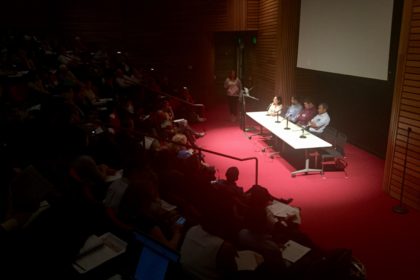
On July 11, 2017, UC Berkeley and UCSF co-hosted the joint symposium, Advancing science and policy to accelerate the global fight against Tuberculosis, bringing together many TB researchers, advocates, and policymakers from around the Bay Area. The symposium, held on the occasion of the first meeting of The Lancet Commission on Tuberculosis, brought together UC Berkeley and UCSF speakers for a vibrant series of short research presentations and panels. Opening remarks were given by Dr. Eric Goosby, the UN Envoy for Tuberculosis, and inspiring closing remarks were given by the Honorable Minister Aaron Motsoaledi, Minister of Health of South Africa, who also serves as chair of the Stop TB Partnership Board.
The global problem is set to take center stage in coming years, as countries begin to mobilize more than ever before around an internationally coalition to ‘End TB’. Ending TB was featured prominently at the 70th World Health Assembly in May 2017, where the new WHO Director-General Dr Tedros Adhanom Gebreyesus was elected to a new five-year term. The first WHO Global Ministerial Conference on ending TB in the Sustainable Development Era will take place in Moscow in November 2017, and in 2018, a UN General Assembly high-level meeting on TB will take place. These high-level meetings are rare, with only a handful on global health issues having been the focus; among them, ending HIV/AIDS, noncommunicable diseases, Ebola, and antimicrobial resistance.
The strengths at UC Berkeley and UCSF, through its many outstanding professional schools, research labs, and departments, span across multi sectoral strengths from the basic sciences, public health, bioengineering, clinical research, implementation science, environmental health, through to law and public policy. The symposium program featured key TB researchers from the UC Berkeley Department of Molecular Cell Biology (Cox Lab), School of Public Health (Riley Lab), and Department of Bioengineering (Murthy Lab). From UCSF, lead research scientists such as Drs. Payam Nahid and Phil Hopewell from the UCSF School of Medicine’s Pulmonology and Critical Care Division and the Curry Center for International Tuberculosis, respectively, were on hand to represent some of the field’s most innovative and forward thinking research. Professor Madhu Pai, a graduate of both UC Berkeley and UCSF, was a visiting panelist from McGill University, and enthusiastically expressed the need for multi sectoral and collaborative approaches to TB’s biggest problems. Dr. Jenny Flood, Director of the TB Control Branch of the California Department of Public Health spoke about California’s strategy to curb TB in California. CDC estimates up to 13 million people in the United States have latent TB infection.
With some Lancet commissioners joining the event in the packed auditorium of the David Brower Center and adding to the lively discussion, there was a consensus that there is a dire need to mobilize a coordinated and collaborative effort, as well as to address the paucity of investment in development the tools, and basic science breakthroughs needed to address the deadly global killer. Despite the research funds invested in infectious disease over the last decades, much attention has been given to HIV/AIDS and Malaria, with TB left in the lurch. Thomas Frieden, director of the Centers for Disease Control and Prevention (CDC) stated in 2016 that TB remains the world’s leading infectious cause of death. In 2015 alone, TB killed 1.5 million people globally. The 2016 Global Tuberculosis Report reported that there is currently a $2 billion investment shortfall in low- and middle-income countries to fight TB, as well as a $1.3 billion gap in adequate research and development funding.
With many global universities on the East Coast invested in TB research and science, the symposium, funded by the Bay Area’s Koret Foundation and put together by the UC Berkeley School of Public Health’s Center for Global Public Health and UCSF Global Health Sciences, was a stark representation that UC Berkeley and UCSF, as well as Stanford University and UC Davis, offer strong training programs, research labs, and some of the brightest TB minds and advocates in the world. The symposium organizers and co-chairs, led by Payam Nahid, Jeff Cox, and Lee Riley, hope the event will be the first of many collaborative initiatives in the years to come, bringing together researchers from the 4 major research universities to help move forward the TB basic science and implementation science research agenda.
As the Honorable Minister Motsoaledi pointed out, the promise in ending TB will happen through promising and forward-thinking science, that is translatable to country health leaders who often struggle to juggle many different public health priorities. With what is sure to be the need for scientific breakthroughs that are also translatable to global communities throughout the world, including the United States, it is clear that UC Berkeley and UCSF, along with other Bay Area partners such as Stanford University and UC Davis, will be ready for the call.
